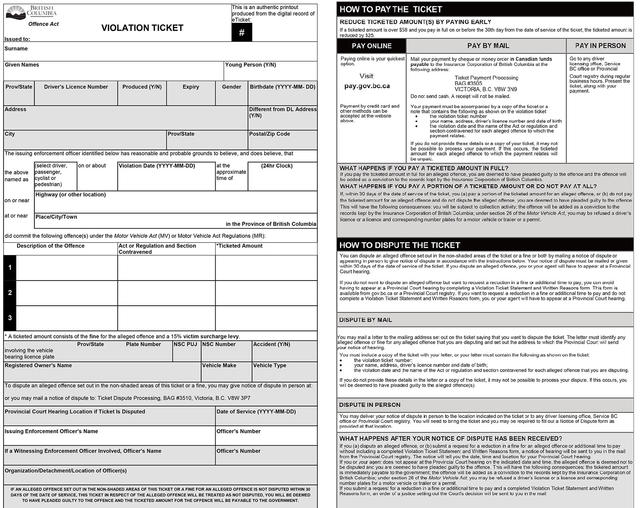 Question: What do I need to know to properly look after my interests if I receive a traffic ticket?
Question: What do I need to know to properly look after my interests if I receive a traffic ticket?
(Article last updated: March 21, 2022)
Here are my thoughts on what I would do if I received a violation ticket: Pull over and stop depending on the circumstances.
Initial Contact
Produce all documents requested. You would be surprised how many people can't handle this part. Listen carefully to what the officer has to say. Once you have listened, if you have a comment or a question ask politely. Even if you are unhappy with the state of affairs, being impolite or argumentative might prevent you from hearing all that is said, and it could be important to your defence.
Traffic Ticket Service
Chances are, at this point the officer will retreat to the police vehicle to prepare the ticket. Use this time to consider your situation, make notes, and prepare any other questions that come to mind. When the officer returns to serve the ticket, listen carefully to what is said again. If the ticket is offered to you to sign, do so if you wish. If not, politely decline. If you choose not to sign, being antagonistic at this point could convince the officer to add to the ticket before serving it to you.
Electronic Traffic Ticket
As of August 2019 the use of electronic tickets for Motor Vehicle Act offences is being rolled out across the province. The hard copy of the ticket given to you by the officer will not have a place for either of you to sign. Signatures are not required and you will simply be handed the copy to deal with. Tickets for offences under other provincial statutes will still be written by hand.

Time for Questions
Ask your questions before you hand the ticket back if you are signing. The officer will not make a quick retreat while you still hold all copies of the ticket. If you are not going to get anywhere with the questions, there is no point in prolonging the agony, hand the ticket back.
Try not to make remarks like "I'll see you in court!" or anything that would upset the officer. He/she will be less likely to accept suggestions to alternate dispositions later on and may choose to oppose fine reductions at trial time.
There is no point in demanding name and badge number, as it is already on the ticket itself. Even if all that is there is the signature, you can still find out who it is by contacting the police service listed on the ticket.
You could ask politely for a business card in case you want to contact the officer later for clarification. The officer will now depart, leaving you to get on with your day.
Make Notes Now
This is a great time to make notes on the situation as you saw it. Record witness details, take pictures, make a sketch, whatever, so that you will be able to recall all the details at a trial a year down the road if necessary. Read all the papers issued to you carefully and thoroughly. Make sure you understand what it says and what is required of you.
Some people run into trouble because they don't take the time to understand what is required of them now.
Understand the Charges
Read the section of the statute that you are charged under. If you don't understand it, don't feel bad, sometimes it is not immediately obvious from the fancy legal wording. Request help if needed.
At this point you should have a fairly good idea what you are up against. If not, you could consider lawyer referral and/or some research.
"Fight That Ticket in British Columbia" is a good title to read. It is out of print and somewhat out of date, but still useful. You may find a copy of it at your library.
There are internet references as well, but try to make sure that you stick to references from British Columbia as procedures can be different elsewhere.
Decide What To Do
You now have to make one of four decisions:
- Decide that you did what the ticket says and pay it. DISCOUNT FOR EARLY PAYMENT: This is only available if you pay the ticket outright at the start. If you dispute, either the allegation or the penalty only, the discount will not apply. The ticket can be paid on line.
- Decide that you did what the ticket says, but follow the instructions on the back of it to dispute the penalty shown on the front of it or in the case where the penalty cannot be reduced, such as speeding, ask for a length of time to pay. You can have the penalty dispute heard at the court nearest to you rather than travelling a long distance if the incident did not happen locally. You make these arrangements at your local court registry office. It helps to take your copy of the ticket with you when you do this. As of July 1, 2003 penalty disputes may be made in writing rather than attending court. The forms to do this with are available on line.
- If you can show that you did not do what the ticket says you did, you could consider contacting the issuing officer or their supervisor and explain. They may choose to withdraw the ticket. Hopefully they will not use the opportunity to issue a new one with the correct offence if they got it wrong in the first place. I can recall once early in my career where I wrote a speed in school zone ticket at 5:05 pm. Obviously it was an invalid ticket and had I been given the opportunity, I would have happily torn it up and apologized. The driver didn't know this and wasted a chunk of his day waiting for a trial that never took place because I realized the mistake the day of the trial and withdrew it prior to his trial.
- Follow the instructions on the back of the ticket and plead not guilty. You will have to attend for trial at the address shown on your ticket.
Share This Article
- Log in to post comments
